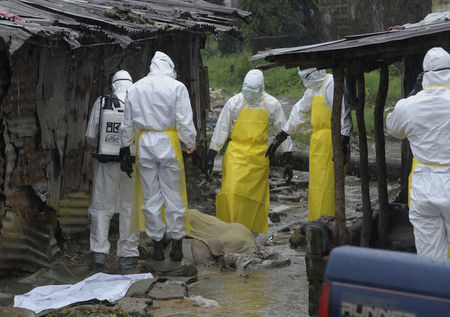By Misha Hussain
DAKAR (Thomson Reuters Foundation) - Liberia is building five new Ebola treatment centres each with capacity for 100 beds as it struggles to contain the spread of world's biggest outbreak of the deadly disease, government and health officials said on Saturday.
The hemorrhagic fever has killed more than 1,500 people and infected over 3,000 in Guinea, Sierra Leone, Liberia, Nigeria and Senegal since March and there is currently no widely available vaccine or cure but early treatment can save lives.
World Health Organisation (WHO) spokesman Francis Kasolo said Liberia was the worst hit country in west Africa, with nearly 700 deaths among about 1,500 cases, and increasing the number of beds in coming weeks would ease the pressure in the country's congested hospitals.
Ebola, which is passed between humans by contact with infected tissues and fluids, has put severe strain on west African health systems, which were already weak due to poverty, corruption and years of civil war.
"The idea is to create five different treatment centres that can accommodate up to 100 beds each. The centres will be based in regions that show the most need but Monrovia will have its fair share," Kasolo, coordinator of the WHO Sub-regional Ebola outbreak coordination centre, told the Thomson Reuters Foundation.
Liberia's Minister of Information, Lewis Brown, confirmed plans to boost the number of beds. He was unable to say how many beds Liberia had currently for Ebola patients.
According to government figures, Liberia has around one hospital bed per 1,250 people and just one nurse or midwife per 3,300 people, amongst the lowest in the world. In contrast, the United Kingdom has one nurse or midwife for every 100 people.
The Liberia government has been criticized for a relatively slow response to the outbreak and a lack of access of basic equipment needed by medical staff and authorities are facing an uphill battle to contain the virus.
Earlier in the outbreak, the overcrowded Elwa Hospital in Liberia's capital, Monrovia, turned away some Ebola cases, a scenario exacerbated by the withdrawal of some international staff following the infection of two U.S. health workers.
Jorge Castilla-Echenique, health sector coordinator for the European Commission's humanitarian arm ECHO, said more beds were critical in Liberia but there was also problems finding staff to run the treatment centres.
"Nobody knows if it will work, but if you don't build the centres, then it is much more difficult to attract staff," said Castilla-Echenique.
He said Ebola had become a question of international security and the WHO was discussing contingency plans in case the new treatment centres failed to control the spread of the disease, including military intervention by foreign forces.
Castilla-Echenique said there was also discussions about building a 1,000 bed "holding" centre, which would require less medical skills and expertise than a treatment centre, and could help isolate people while they awaited test results.

Kasolo declined to comment on the possibility of foreign intervention or plans for a holding centre but said a "number of models" were being discussed for future action.
(Editing by Belinda Goldsmith)
